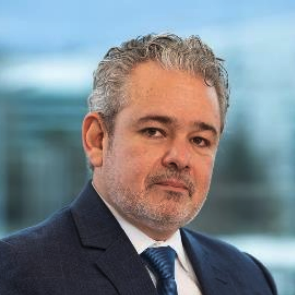“Building trust will be indispensable to get the consensus needed to move forward. As the Secretary of the Standing Committee on the Law of Patents, I have improved trust among delegations and with the Secretariat, positively influencing the work of this norm-setting committee.” – Marco Alemán
 Dr. Marco Alemán is one of 10 candidates to succeed Francis Gurry as Director General of the World Intellectual Property Organization (WIPO). The WIPO Coordination Committee will nominate one candidate on March 5 and 6, before he or she is formally appointed by the WIPO General Assembly. Alemán currently holds the post of Director of the Patent Law Division. After acting as Director of the Colombian Industrial Property Office, he started his career in 1999 at WIPO as Principal Administrator of Cooperation Programs for the Development for Latin America and the Caribbean, then as Deputy Director of the Division of Public Policy and Development, and later as Deputy Director of the Patent Law Division.
Dr. Marco Alemán is one of 10 candidates to succeed Francis Gurry as Director General of the World Intellectual Property Organization (WIPO). The WIPO Coordination Committee will nominate one candidate on March 5 and 6, before he or she is formally appointed by the WIPO General Assembly. Alemán currently holds the post of Director of the Patent Law Division. After acting as Director of the Colombian Industrial Property Office, he started his career in 1999 at WIPO as Principal Administrator of Cooperation Programs for the Development for Latin America and the Caribbean, then as Deputy Director of the Division of Public Policy and Development, and later as Deputy Director of the Patent Law Division.
- Positioning WIPO for the Challenges Ahead
WIPO’s shift to a more modern organizational and operational approach, reinforcing our position of leadership within the IP community, is just beginning. With over 20 years of experience delivering results at WIPO, I am committed to driving the organization into this new era.
We all feel the world changing rapidly around us, but we do not fully understand the impact this will have on innovation, creative and entrepreneurial endeavors, the IP system, and the way we do business. For WIPO to remain relevant, it needs to be agile enough to harness the disruption ahead. As we face the crossroads of the fourth industrial revolution, we must either embrace it or risk irrelevancy. Under my leadership, WIPO would continue to integrate technologies such as artificial intelligence in our activities, while demystifying the relationship of such advances with the IP system.
Like us, our stakeholders are reflecting on how the changes will affect them. We can support Member States and others to anticipate and react to important shifts affecting IP, offering guidance as to appropriate strategies. At the same time, it is imperative that we build resiliency into our systems and services, upon which millions of IP users depend, to ensure they remain cost-effective and reliable. This will require a renewed partnership with Member States and intensified engagement with IP users. Ultimately, strong partnerships will be essential to ensuring the IP system fulfils its potential to drive progress and enable economies to prosper.
- Combining Insight and Experience with Inclusive Multilateralism
Our increasingly knowledge-based economies require well-functioning IP systems to thrive. WIPO plays a key role in supporting countries to identify what it will take to succeed through their own innovation and creativity. To do this, it is essential for us to assemble thought leaders, innovators, creators, and policy makers to share their insights and engage in dialogue about what is needed to achieve these goals, as was done at the symposium on trade secrets organized under my direction in 2019. We will continue to reach important benchmarks and gain insight from analytics through IP indicators and economic studies. The focus on expertise and evidence-based research can be scaled, and it should become the prevailing practice at our organization.
Serving as the epicenter for dialogue and research on intellectual property is vital to WIPO’s function as a norm-setting organization and manager of the global IP architecture. Maintaining and updating the 26 treaties, which include the international registries, requires the collaboration of Member States. To keep up with the speed of technology development and its impact on our cultures and societies, WIPO’s political bodies must work efficiently and decisively. To achieve this goal, we must ensure that normative discussions do not last for decades; otherwise, the achieved outcomes will already be irrelevant. We must also recognize that building trust will be indispensable to get the consensus needed to move forward. As the Secretary of the Standing Committee on the Law of Patents (SCP), I have improved trust among delegations and with the Secretariat, positively influencing the work of this norm-setting committee.
- Promoting Efficiency and Cost-Effectiveness in the IP System
Core to WIPO’s mission is the delivery of efficient and cost-effective mechanisms for the protection of IP rights internationally. It is imperative that we continuously improve these systems to make sure they bring value to our users.
WIPO must invest in the infrastructure and technology to keep our registries functioning at the high-level standard that our users expect. Since international applications are at an all-time high, WIPO needs to develop tools to effectively manage these increasing numbers without sacrificing data safety, timeliness or the quality of the process and decisions we make. We can leverage our size and expertise to not only streamline our own operations, but also to support the work of Member States. WIPO should lead the charge to mainstream technologies based on artificial intelligence in the areas of automated classification, helpdesk services, machine translation, and data analysis._ Through WIPO’s leadership and investment in testing, we can decrease the time and cost to adopt these advances.
To maximize the benefit, we have to expand our partnerships. We must align our registration systems and services with their current and future needs. This requires the development of tools while taking into account a wide variety of approaches, from the individual artist or inventor to public institutions, from small businesses to the largest corporations. And our tools and services should support offices of all sizes, from the smallest operations to the largest.
- Assisting Member States to Benefit from IP Systems
The use of IP systems is highly concentrated and there are still a number of countries not yet reaping the benefits. Many countries still are unable to experience the positive effects that IP rights can have in helping them achieve their social development and economic goals. While we provide assistance today, our efforts do not always result in meaningful progress. Effective programs that facilitate access to IP rights and their management to drive advancement must take into account both the benefits that the IP system brings and the other challenges faced by Member States.
This holistic approach, anchored in policy coherence and an approach to technical assistance based on a medium-term strategy and appropriately adapted to context, is necessary for WIPO’s technical assistance to produce a lasting impact. However, it does not require establishing entirely new programs. Instead, we can better utilize WIPO’s resources and talent by coordinating our efforts across the organization. Each project we take on should be customized for each Member State with an aim towards independence. Our work should feature outcome-driven objectives, analyzed regularly to empower us to change course to adapt to shifts in the environment or priorities. It should also embrace programs to expand IP benefit to different fields, like rural tourism development and agroindustry, which tend to benefit from the quality of their products.
Putting innovation policy into context is crucial to achieving the UN’s Sustainable Development Goals. WIPO must take a leading role in engagement within the UN regarding policies and programs that foster innovation (SDG 9). Efforts to reduce poverty and inequalities and to promote inclusive and sustainable economic growth are accelerated by innovation and are therefore central to WIPO’s mission. This creates an imperative to engage with the UN system and Member States accordingly.
While WIPO can guide Member States seeking assistance, countries must ultimately take the reins to design work programs that will achieve their own objectives. The best results consistently emerge when Member States take on the role of a partner rather than a passive participant. The Inventor Assistance Program (IAP), a program under my leadership, is a good example of this. The IAP empowers the local patent office to engage in outreach and to more fully support their under-resourced inventors with guidance from WIPO. This demands moving away from ad-hoc assistance and towards strategically designed engagements that put countries on a more sustainable pathway.
- Structuring WIPO’s Team for Agility to Accelerate Innovation
WIPO’s team must be ready for the disruption ahead. We can empower the staff to work more seamlessly across the organization, encourage deeper collaboration, and reduce duplication. This includes creating new centers of excellence to leverage WIPO’s talent across sectors and allowing more room for targeted experimentation. In our projects, our routine practice should be to regularly pulse programs to ensure the best allocation of resources.
A key priority will be to attract and retain top talent who have the skills we need to succeed in the future. Our team should reflect not only a commitment to our mission but also the diversity of Member States and stakeholders we support. Gender equality and women’s empowerment will be high priorities of WIPO management.
Positioning WIPO for the future demands thoughtful leadership, built on the trust of Member States and all stakeholders. I can offer the leadership and transparency necessary to advance WIPO’s important work driving innovation, creativity, and the entrepreneurial spirit to everyone’s benefit.

![[IPWatchdog Logo]](https://ipwatchdog.com/wp-content/themes/IPWatchdog%20-%202023/assets/images/temp/logo-small@2x.png)

![[Advertisement]](https://ipwatchdog.com/wp-content/uploads/2024/04/Artificial-Intelligence-2024-REPLAY-sidebar-700x500-corrected.jpg)
![[Advertisement]](https://ipwatchdog.com/wp-content/uploads/2024/04/UnitedLex-May-2-2024-sidebar-700x500-1.jpg)
![[Advertisement]](https://ipwatchdog.com/wp-content/uploads/2024/04/Patent-Litigation-Masters-2024-sidebar-700x500-1.jpg)

![[Advertisement]](https://ipwatchdog.com/wp-content/uploads/2021/12/WEBINAR-336-x-280-px.png)
![[Advertisement]](https://ipwatchdog.com/wp-content/uploads/2021/12/2021-Patent-Practice-on-Demand-recorded-Feb-2021-336-x-280.jpg)
![[Advertisement]](https://ipwatchdog.com/wp-content/uploads/2021/12/Ad-4-The-Invent-Patent-System™.png)






Join the Discussion
One comment so far.
angry dude
February 13, 2020 12:51 amUS Patent System is 230 years old and it was established by George Washington among others… like Thomas Jefferson.. you know … dudes on your dollar bills
How old is WIPO and who is this guy ?